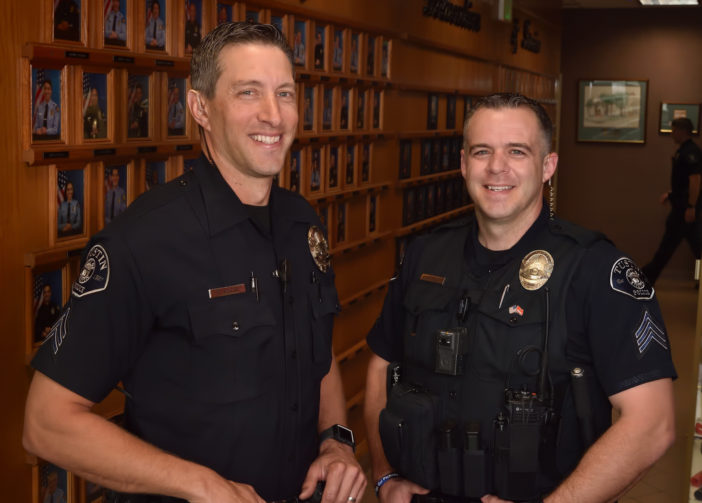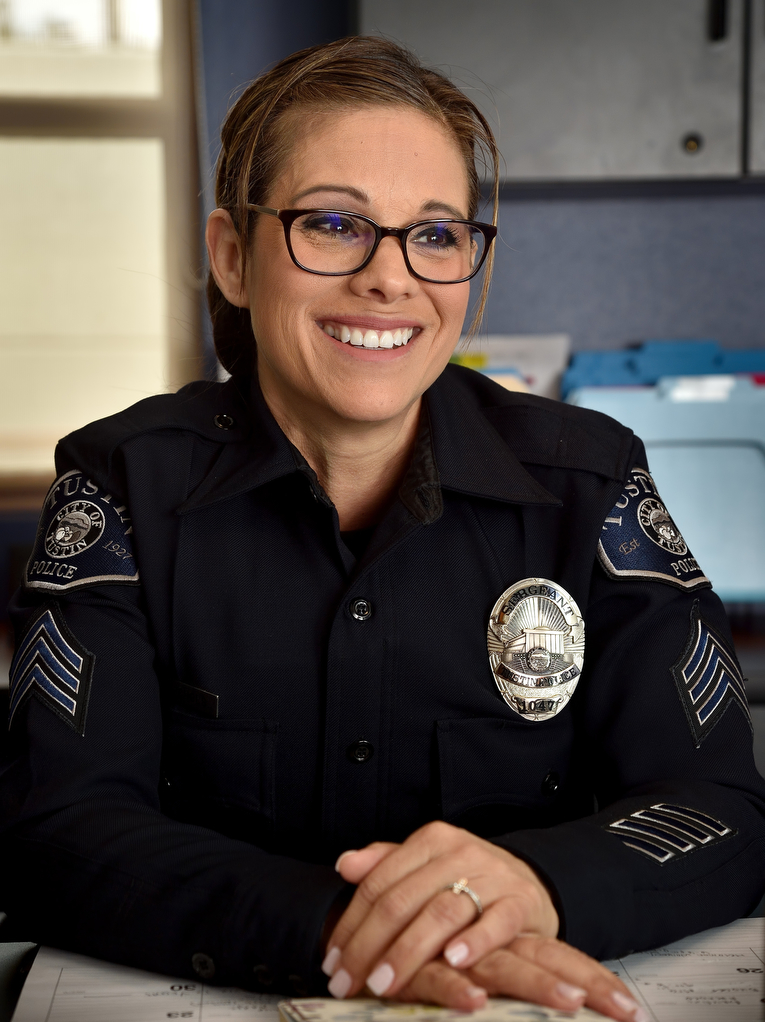When the time comes, the officers know.
It’s a gut feeling. They’re ready for a new challenge.
That’s when it’s time to test for a promotion within a law enforcement agency.
Each agency handles promotions differently, so requirements vary from place to place. But all have one thing in common – the high-stress testing environment weeds out those who might not be ready for the next step.
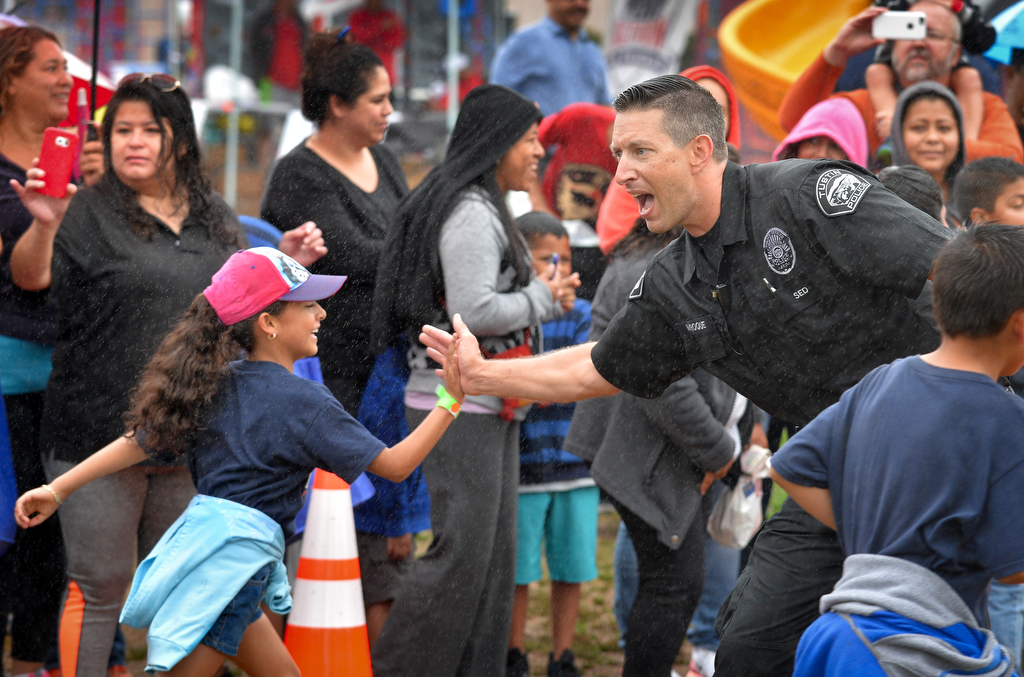
Tustin Police Sgt. Matt Roque gives kids high-fives to kids running around the track as the rain comes down during Tustin Police Department’s Run Club at Robert Heideman Elementary in this file photo.
File photo by Steven Georges/Behind the Badge OC
At the Tustin Police Department, testing varies by position. Officers are encouraged to gain experience in special assignments such as the SWAT team, K9, traffic, investigations, and more before going for a promotion.
South Area Patrol Sgt. Don Houle was promoted earlier this year. Houle has been with the Tustin Police Department for 13 years and also serves as range sergeant. He spent about nine years in patrol and on special assignments as a motorcycle officer and field training officer before testing to become a sergeant.
“Working for a small agency, there’s only so many opportunities,” said Matt Roque, who also promoted to sergeant this year. “If there’s something you’re interested in, you need to have your name on that list because you never know when the next opportunity is going to arise.”
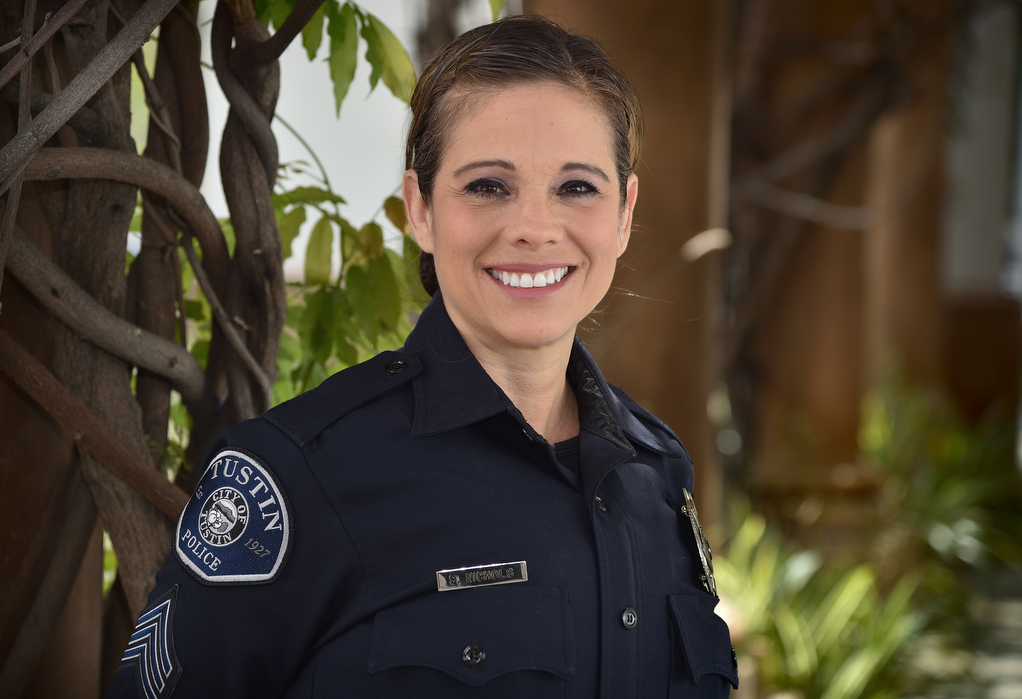
Lt. Stephanie Nichols of the Tustin Police Department was recently promoted.
Photo by Steven Georges/Behind the Badge
Lt. Stephanie Nichols worked as a field training officer and personnel officer at the Tustin PD, and as a recruit training officer at the Golden West Police Academy, before testing for sergeant in 2008. She was sworn-in as a sergeant the next year, and she promoted to lieutenant in spring 2019.
“Tustin has given me so many opportunities,” Nichols said.
Nichols suggests new officers find a mentor within the agency who can give insight and recommend training and educational opportunities.
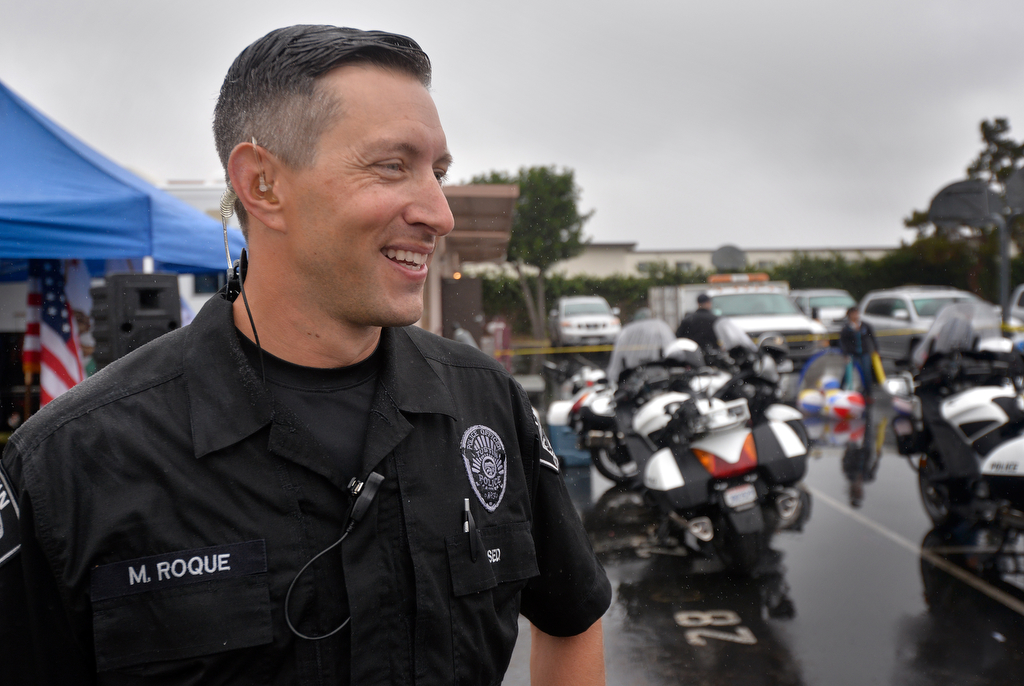
Tustin Police Sgt. Matt Roque talks about the Tustin Police Department’s Run Club at Robert Heideman Elementary in this file photo.
File photo by Steven Georges/Behind the Badge OC
Special assignment tests are good practice because they put officers in front of oral interview panels to judge their communication skills, knowledge, and more. Officers fill out an application explaining why they would be a good fit for the role, all similar to the process for advancing in rank.
“The interview was definitely stressful,” Houle said of his test to become a motorcycle officer in the traffic unit. He recalls waiting with six other applicants for two positions. “There’s a lot of studying and preparation for that process.”
Experience matters
Roque was a Tustin police dispatcher before being hired as a sworn officer. He worked in patrol, special enforcement, and, like Houle and Nichols, as a field training officer before testing for sergeant.
“You’re making decisions about people’s livelihood,” Houle said. “So you need to be able to balance the needs of the agency versus the needs of the individual.”
Being a field training officer gives law enforcement personnel experience in leadership, mentoring, and helping shape the culture at the Department through their trainees.
“The police department here has really taken good care of me and I saw (field training) as a way for me to take care of the agency,” said Houle, who’s trained over 20 officers. “I wanted to be involved in the future of the agency.”
As a sergeant, Nichols worked in the field and then spent nearly five years in general investigations.
“I did 4.5 years up there with an amazing group of talented detectives and investigators,” Nichols said. “We worked some amazing cases. I was having such a great time and really enjoying it and learning a lot.”
Upon her return to patrol, Nichols decided to test for lieutenant.
“I just want to make a difference,” Nichols said. “I’ve been a sergeant for 10 years and I’ve really enjoyed mentoring and working with the people I work with, they’re an amazing group. I just wanted something else, a challenge, and the opportunity came up.”
The dreaded test
Promotional exams involve an application submitted through the government website, followed by a written test (for sergeant candidates), a 10-minute oral presentation in front of superior officers, known as the “Ring of Fire,” and finally an outside oral interview with officials from other police agencies.
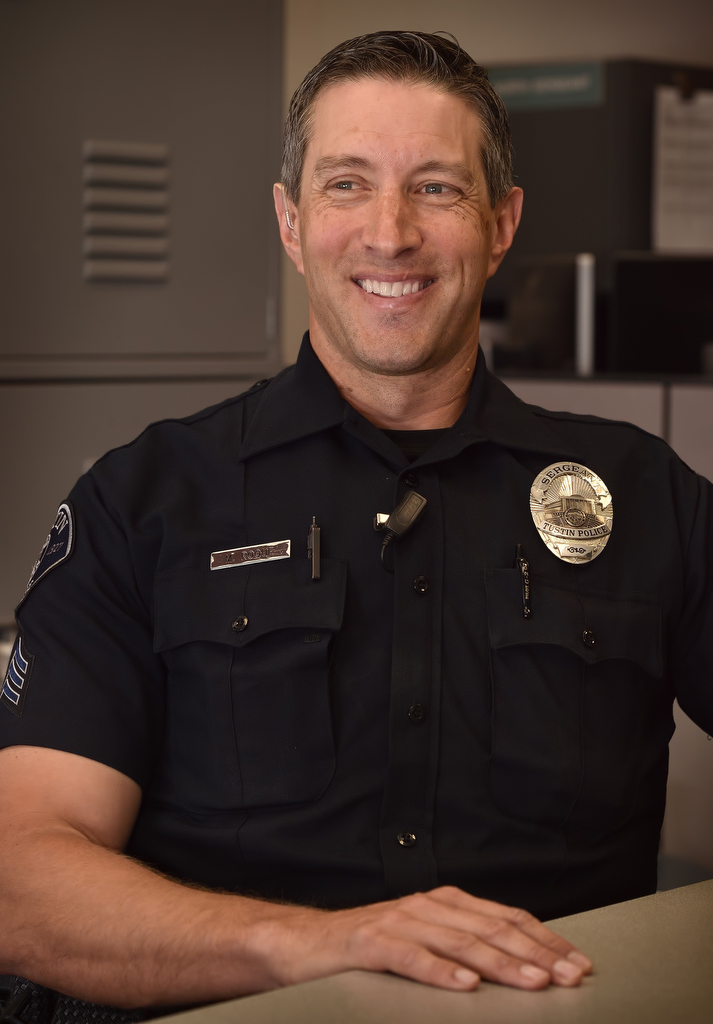
Sgt. Matt Roque talks about the promotion process at the Tustin Police Department.
Photo by Steven Georges/Behind the Badge
“You take every step and go, ‘Okay, I passed the written. Okay, let’s work on the next one,’” Nichols said. “It’s just getting through the process and then once you make it at the end, now it’s out of your hands.”
Those that pass are placed on a list for consideration when a job opens, usually due to retirement or an officer leaving for other reasons.
Officers don’t always make it on the first try. Both Roque and Nichols tested for sergeant twice before being placed on the list.
“There was a lot of really good feedback that I received on how I can improve myself and how I can be more ready for the position,” Roque said. “I took that feedback to heart in the last two years. I really spent a lot of time focusing on that, bettering myself in the areas that were considered weaknesses.”
For many, the 10-minute oral presentation is the hardest. Candidates are allowed notecards, but no props or visuals.
“I was very nervous,” Nichols recalls. “The presentation was the worst. Going in front of your peers and people who’ve known you, giving a 10-minute presentation, you’re trying not to be nervous and to not forget anything.”
Prospective promotees practice by presenting their speech to friends, coworkers, and family members – pretty much anyone who will listen, including other parents from kids’ baseball teams.
“Just putting myself in that awkward situation like it is when you’re standing and speaking in front of a room of 40 people showing no emotion,” Roque said.
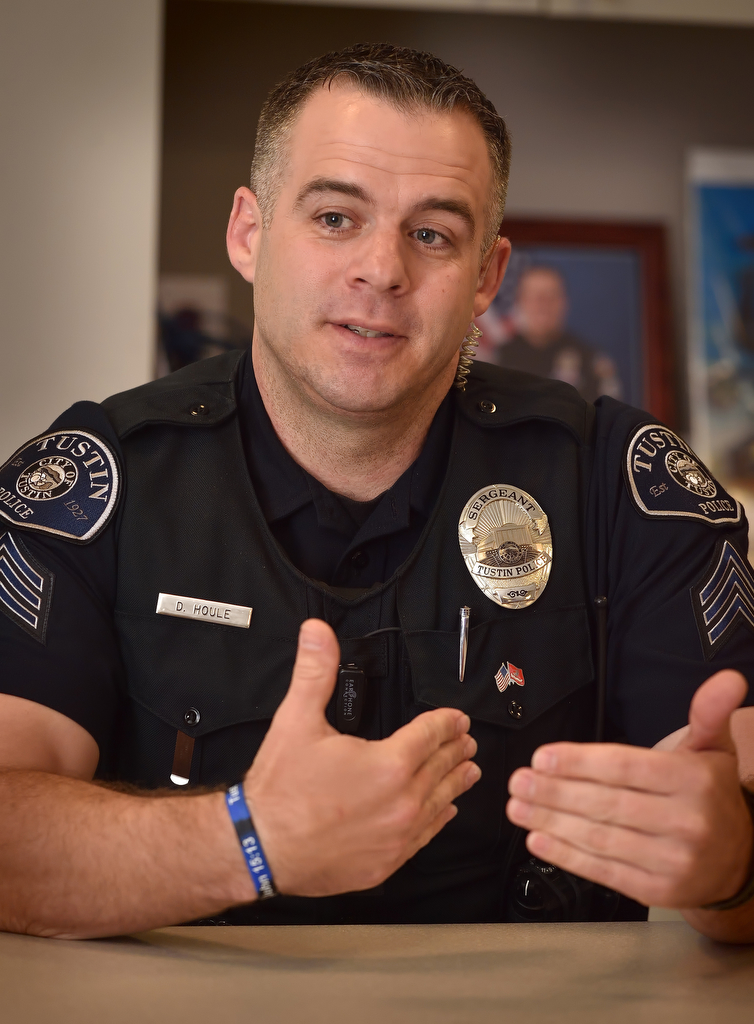
Sgt. Don Houle talks about the promotion process at the Tustin Police Department.
Photo by Steven Georges/Behind the Badge
The entire testing process can take two to six months, giving applicants plenty of time to prepare – and to worry over their performance.
But at Tustin PD, those aiming for a new rank have support from their peers.
“About 10 of us were studying and going through the process,” Nichols recalls of her sergeant test. “We studied together, had study groups, study guides, we would test each other, quiz each other.”
That encouragement is what makes Tustin stand out against other, more competitive agencies.
“I think the good thing about this department, and the testing process, both times we were very close knit through the process, really supported each other,” Roque said. “There were never really any hard feelings when someone else promoted.”
 Behind the Badge
Behind the Badge
